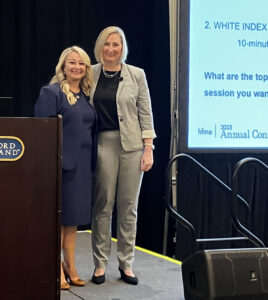The Gist
From the health of health systems and a focus on the future to the rising importance of advance automation and making the most of analytics. So much was discussed during HFMA Nashville this year. Here are one revenue cycle expert's takeaways.
Attending conferences is about the people. Making new connections and greeting old friends.
This year’s HFMA Annual Conference in Nashville was no exception.
I’ve been in the revenue cycle industry for more than 25 years — across providers, consultants, and now automation technology. I’ve built up an extensive network of personal relationships. And large conferences like HFMA are an excellent opportunity to reconnect with those folks. Whether it’s dinner with customers, casual conversations with fellow HFMA organizers, or meet-ups with former coworkers from my Advisory Board days, it’s just refreshing to interact with people outside of Zoom and official meetings.
Healthcare is such a small, big world. Attending these conferences is fun because you’re always surprised by the connections you make and reestablish.
And the swag! Did you get any socks from the AKASA booth? They’re my favorites.

It’s also always interesting to see what people are chatting about. What concerns are coming up? What’s working well for different organizations? Here are a few of the insights I picked up during the conference this year.
1. Health Systems Are Hurting
We’re not out of the slump yet. Yes, hospitals’ operating margins are finally (slightly) on the positive side, but they’re still low compared to historical numbers. Hospital mergers and acquisitions are on the rise. Labor expenses are up 21% compared to 2020, with wages for nurses rising rapidly.
During HFMA, there were endless conversations and panels on how hiring and retaining staff is still a significant struggle for healthcare and the revenue cycle. More than 57% of health systems have 100+ open roles to fill in operations. Hospital CEOs cited workforce challenges as their biggest issue earlier this year, according to the American College of Healthcare Executives (ACHE). And it’s not getting better.
My team here at AKASA put together a resource of strategies that can help: Solving Today’s Greatest Staffing Challenges in the Healthcare Revenue Cycle.
Give it a read, and email me to let me know what you think.
2. The Focus Is on the Future
Despite all this doom and gloom and numbers not where we’d like them, HFMA was still filled with hope. We’re emerging from the dark COVID cloud and getting things back in order. You could see that by conference attendance. Many of the sessions were standing-room only. When was the last time you saw that?
This is the first conference I’ve attended where people weren’t laser-focused on the pandemic. We’re pivoting to how we may be entering a period of stability and how we can look to the future. But how do we reset for that future, and what does it look like?
3. Innovation Remains a Key Topic
No one is more tired than me of the word “innovation.” For years, all it seems we do is “innovate.” But at HFMA and throughout the industry, it’s still a significant conversation thread.
I’m the co-chair for HFMA’s Texas State Conference and chair for the South Texas chapter. Whenever we survey CFOs and healthcare leaders about what they want to learn more about, they inevitably say innovation.
Everyone is clamoring for how we can better adapt and explore all the new technologies out there. Thanks, ChatGPT.
We all recognize that we can’t get where we need to go without solving problems in a different way than we’ve done traditionally. Even if that means hiring chief transformation officers.
We’ve been having the same discussions in the revenue cycle for the past several decades: how do we reduce churn, get more money in the door, increase productivity, and drive down denials? We need to get more done.
We need to innovate.
4. AI-Powered Automation Is Mission-Critical
If you want different results in healthcare, something has to change. Automation is often the extra oomph your team needs to succeed. By automating mundane and time-consuming tasks, your team can focus on the more critical and complex workflows.
Automation was everywhere at HFMA — from the agendar to the vendor floor. No one should be surprised by that. But did you know that not all automation is the same?
You may have seen vendors focusing on robotic process automation (RPA). This technology is good for basic, linear tasks (like simple order entry, clinic staffing and scheduling, P&L reporting, etc.). But if you want to automate a more complex process (like auth initiation or claim attachments), RPA isn’t advanced enough to handle it. Plus, if a payer updates a portal or moves a field, your RPA bot will fail. Then you’ll need to spend precious budget and time fixing it.
Artificial intelligence (AI) — and its subset of machine learning (ML) — however, learn and grow as they’re exposed to more data. They get smarter with every task they complete and every challenge they encounter. That means this advanced technology can take on more of the claims processing we all deal with daily.
Want to get really innovative? Let’s talk generative AI and large language models (LLMs).
There are so many new things going on in the world of ML right now. It’s easy to get confused by all the terms.
- Deep learning is ML using deep neural networks, teaching computers how to process data as humans do.
- Generative AI is a deep learning model that can not only interpret natural language, but also create new content or data based on existing data sets.
- Large language models (LLMs), like ChatGPT and Bard, are an example of generative AI. They either take a short prompt and turn it into a robust document or take a large amount of text and distill it into a few sentences. This has the possibility to bring true innovation to healthcare in the months and years ahead. And health systems are implementing them right now.
With so much change in the world of automation, it’s easy to be skeptical. Some vendors haven’t delivered on promises. Some vendors are suddenly talking about AI when they don’t have a history in that technology. This is all contributing to confusion about what exactly automation technology is and what differentiates vendor offerings.
“Automation” isn’t just about simplifying workflows. It’s about removing the work from people’s plates. The only way to do that is to have AI-powered automation, not RPA.
Look for automation that can help you build the future of your revenue cycle organization in a sustainable way, not just plugging holes and requiring more maintenance.
Before bringing any automation technology into your organization, ensure you know what you need and who can provide it. Here are nine things to look for when selecting an RCM automation provider.
5. Show Me the ROI
What is every CFO asking for? Proof. They want to see the return on investment (ROI) before approving a new project or investment. As they should. When budgets are tight, projects with the highest ROI are the ones getting the green light.
Many sessions at HFMA focused on that fact. How can you cut through the buzzwords and figure out what a new technology, new process, new strategy can do for your organization? The old adage of: show don’t tell. Get the proof points for how others are implementing it and seeing success.
Want to dig into ROI for revenue cycle automation? Here’s a report from the Health Management Academy that will help you do just that.
6. Change Management
If you want to see true ROI with revenue cycle automation, you must have a change management strategy in place.
That’s the topic Heather Schneider, CFO of Penn Highlands Healthcare, and I presented at HFMA.

Change management is the practice of preparing and supporting people at an organization as changes such as new technologies, processes, or workflows are rolled out. This allows people to grow and change as the organization does. It’s the single most critical component of an automation strategy.
What Is Change Management in Healthcare?
When we surveyed the room during our talk, only 54% of leaders said they have an existing change management strategy. That leaves about half of organizations without one. And your plans will fail without one.
Change management starts when you get the first idea. Who are you getting buy-in from? How are you spreading awareness of the change? How are you reallocating and training staff? Are you setting the right goals and KPIs? How are you making sure your vendor and staff are doing what you expect them to do?
The HFMA agenda had plenty of leaders discussing trends and how-dos about automation. Heather and I wanted to share some practical strategies about change management that will positively impact your operations.

7. How To Make the Most of Your Analytics
Health systems have always suffered from an overabundance of data. It’s one of our industry’s major challenges.
This was a common trend at HFMA: What do we do with all of that data, and how do we make the most of it?
During the opening keynote session, William B. Rutherford, executive vice president and CFO of HCA, said data is going to be more important than ever. Health systems need to make data-driven decisions in response to challenges.
8. Digitizing Patient Access and Payments
Another thing I noticed at HFMA: Lots of conversations about digital engagement.
Organizations are continuing the push to move patient interactions into digital formats. Scheduling appointments, filling out documentation, registering, checking in, paying, etc. It’s the future. How can we do it more effectively and holistically is what we’re all figuring out right now.
9. No More Surprise Billing
Anyone who knows me knows that I am very passionate about the patient financial experience.
Revenue cycle teams need to shift from back-end operations to a front-end function that improves that overall experience. This enables hospitals and health systems to improve the accuracy and efficiency of their revenue cycle operations. And it’s critical to ensuring patients receive the full benefits for which they are eligible and that they get an accurate medical bill — the first time — every time.
About 40% of Americans are confused by medical bills, largely because of puzzlement over what they’re being billed for, uncertainty if they can pay the bill, and delayed timing on receiving a bill.
Surprise bills make the process even more complex. They leave patients with financial burdens they didn’t expect. These surprise bills often go unpaid, which impacts a patient’s credit and results in bad debt for the healthcare system. With healthcare systems often struggling to find enough funding as is, surprise medical bills are a lose-lose for everyone involved.
We’re all seeing legislation at the state level about surprise bills. I heard many leaders at HFMA express frustration about the government moving from being charged per appeal to being charged per line item for things like remediation. It’s nuts. When you get a denial or a letter saying you didn’t process the claim correctly, it’s going to get expensive. It’s diverting more resources to doing that work and meeting those deadlines and guidelines. There needs to be a better way that doesn’t strain rev cycle resources and put additional financial confusion and burdens on patients.
So, that’s it until next June when we all get together again in Vegas.
In the meantime, want to discuss any of these trends, meet up with me at an upcoming conference, or learn about automation in the revenue cycle? Shoot me an email anytime. See you on the Strip!

Amy Raymond serves as the senior vice president of revenue cycle operations and deployments at AKASA, where she maintains operational responsibility for the production and performance of the firm’s AI-driven automation platform. Across her 25-year career in revenue cycle, Raymond has held several leadership, consulting, and implementation roles. Her industry experience includes tenures at national and regional health systems, as well as numerous care settings and specialties. Most recently, Raymond served as a senior leader in the revenue cycle technology vertical at Advisory Board. Her extensive professional expertise includes: end-to-end revenue cycle operations, process redesign/optimization, patient financial experience improvement, technology deployment/adoption, change management, and employee engagement. As a military spouse, Raymond is a passionate advocate for mil-spouse hiring and community support.









